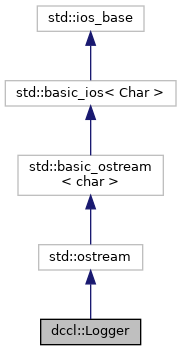The DCCL Logger class. Do not instantiate this class directly. Rather, use the dccl::dlog object. More...
#include <dccl/logger.h>
Inheritance diagram for dccl::Logger:

Public Member Functions | |
| bool | is (logger::Verbosity verbosity, logger::Group group=logger::GENERAL) |
| Indicates the verbosity of the Logger until the next std::flush or std::endl. The boolean return is used to take advantage of short-circuit evaluation of && to avoid spending CPU time generating log files that if they are not used. More... | |
| template<typename Slot > | |
| void | connect (int verbosity_mask, Slot slot) |
| Connect the output of one or more given verbosities to a slot (function pointer or similar) More... | |
| template<typename Obj > | |
| void | connect (int verbosity_mask, Obj *obj, void(Obj::*mem_func)(const std::string &msg, logger::Verbosity vrb, logger::Group grp)) |
| Connect the output of one or more given verbosities to a member function. More... | |
| void | connect (int verbosity_mask, std::ostream *os, bool add_timestamp=true) |
| Connect the output of one or more given verbosities to a std::ostream. More... | |
| void | disconnect (int verbosity_mask) |
| Disconnect all slots for one or more given verbosities. | |
Detailed Description
The DCCL Logger class. Do not instantiate this class directly. Rather, use the dccl::dlog object.
Member Function Documentation
◆ connect() [1/3]
template<typename Obj >
|
inline |
Connect the output of one or more given verbosities to a member function.
- Parameters
-
verbosity_mask A bitmask representing the verbosity or verbosities to send to this slot. For example, you can use connect(WARN | INFO, this, &MyClass::slot) to send both WARN and INFO messages to MyClass::slot. obj Pointer to the instantiation of the class of which this member function should be called. mem_func Member function of type (void*) (const std::string& msg, logger::Verbosity vrb, logger::Group grp)
◆ connect() [2/3]
template<typename Slot >
|
inline |
Connect the output of one or more given verbosities to a slot (function pointer or similar)
- Parameters
-
verbosity_mask A bitmask representing the verbosity or verbosities to send to this slot. For example, you can use connect(WARN | INFO, slot) to send both WARN and INFO messages to slot. slot The slot must be a function pointer or like object (e.g. boost::function) of type (void*) (const std::string& msg, logger::Verbosity vrb, logger::Group grp)
◆ connect() [3/3]
|
inline |
Connect the output of one or more given verbosities to a std::ostream.
- Parameters
-
verbosity_mask A bitmask representing the verbosity or verbosities to send to this slot. For example, you can use connect(WARN | INFO, &std::cout) to send both WARN and INFO messages to std::cout. os Pointer to a std::ostream add_timestamp If true, prepend the current timestamp of the message to each log message.
◆ is()
|
inline |
Indicates the verbosity of the Logger until the next std::flush or std::endl. The boolean return is used to take advantage of short-circuit evaluation of && to avoid spending CPU time generating log files that if they are not used.
The typical usage is
dlog.is(INFO) && dlog << "Something of interest." << std::endl;
dlog.is(WARN, ENCODE) && dlog << "Something bad happened while encoding." << std::endl;
- Parameters
-
verbosity The verbosity level to tag the following message with. These levels are used to direct the output of dlog to different logs or omit them completely. group The group that this message belongs to.
The documentation for this class was generated from the following file:
- dccl/logger.h
 1.8.17
1.8.17